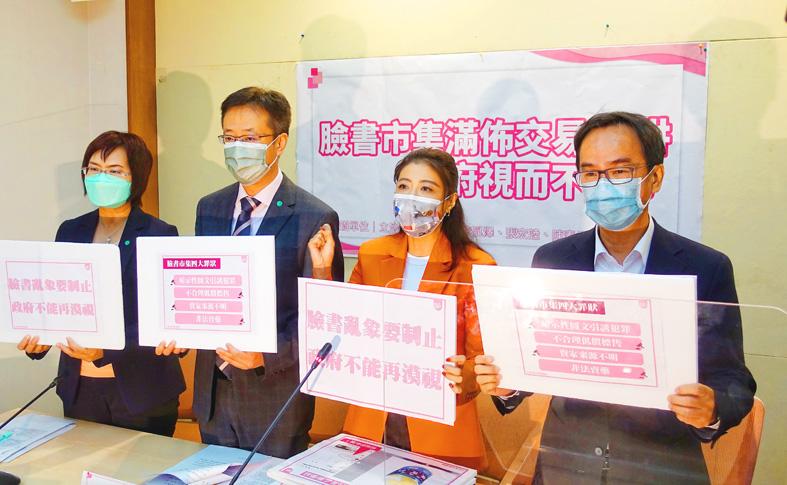Legislators yesterday called for stricter regulation of Facebook Marketplace to address a surge in scams on the peer-to-peer site, calling the government’s current approach ineffective and in need of a bold response.
Democratic Progressive Party (DPP) Legislator Michelle Lin (林楚茵) said that many fraudulent posts on the commerce platform use suggestive images or unreasonably low prices to lure customers, while some do not specify the source of the product they purport to sell.
Some illegally sell medication or drugs, she said, adding that she has seen a town house for sale on the Web site for just NT$320.

Photo: Liu Ming-de, Taipei Times
Although the Ministry of Economic Affairs has regulations governing online retail platforms, it does not have any means to respond to such scams without jurisdiction over Facebook, Lin said.
The government cannot do anything about the marketplace, and yet it still provides Facebook public funds to promote its posts, she said.
The social media giant’s Taiwan office is only responsible for marketing and must send any problems to its corporate headquarters, Lin said.
A week ago the office tried to contact its headquarters, but they have not responded, she said, adding that even legislators’ messages are going unanswered.
“How can the government turn a blind eye to a platform so opposed to Taiwanese law, full of suggestive content and scams?” she asked.
The National Communications Commission (NCC) needs to “muster the courage” to address the issue, DPP Legislator Chen Su-yueh (陳素月) said, adding that the platform must more effectively block inaccurate postings.
Facebook has a social responsibility to its users and to follow local laws, yet on marketplace, pornographic content is readily available, not to mention the sales of illicit drugs, DPP Legislator Chang Hung-lu (張宏陸) said, asking who should be held accountable.
The COVID-19 pandemic has pushed retail online faster than anticipated, making services such as marketplace important public spaces and increasingly favored platforms for scammers, DPP Legislator Lee Kun-tse (李昆澤) said.
The NCC and Department of Commerce keep “kicking the ball back and forth” on regulation, yet it is the NCC’s responsibility to request that a post be taken down, he said.
As digital platforms are not good at self-regulating, governments must step in, National Taipei University of Technology intellectual property institute associate professor Christy Chiang (江雅綺) said.
A foreign-based company such as Facebook can dodge local laws, making it hard to regulate and ensure fair competition, she said, calling for the creation of a regulatory entity.
The Internet lacks a centralized authority, but most sites can be held accountable through their corporate counterpart, NCC Planning Department Director Wang De-wei (王德威) said.
Its borderless nature makes it extremely difficult to manage, but the NCC is working on drafting a digital communications bill based on EU law, he added.
The bill would require Web sites to register locally with a legal representative and require the platforms to self-regulate, while also removing illegal content when requested by local authorities, he said.

Taiwan would welcome the return of Honduras as a diplomatic ally if its next president decides to make such a move, Minister of Foreign Affairs Lin Chia-lung (林佳龍) said yesterday. “Of course, we would welcome Honduras if they want to restore diplomatic ties with Taiwan after their elections,” Lin said at a meeting of the legislature’s Foreign Affairs and National Defense Committee, when asked to comment on statements made by two of the three Honduran presidential candidates during the presidential campaign in the Central American country. Taiwan is paying close attention to the region as a whole in the wake of a

President William Lai (賴清德) has appointed former vice president Chen Chien-jen (陳建仁) to attend the late Pope Francis’ funeral at the Vatican City on Saturday on his behalf, the Ministry of Foreign Affairs said today. The Holy See announced Francis’ funeral would take place on Saturday at 10am in St Peter’s Square. The ministry expressed condolences over Francis’ passing and said that Chen would represent Taiwan at the funeral and offer condolences in person. Taiwan and the Vatican have a long-standing and close diplomatic relationship, the ministry said. Both sides agreed to have Chen represent Taiwan at the funeral, given his Catholic identity and

Chinese Nationalist Party (KMT) Chairman Eric Chu (朱立倫), spokeswoman Yang Chih-yu (楊智伃) and Legislator Hsieh Lung-chieh (謝龍介) would be summoned by police for questioning for leading an illegal assembly on Thursday evening last week, Minister of the Interior Liu Shyh-fang (劉世芳) said today. The three KMT officials led an assembly outside the Taipei City Prosecutors’ Office, a restricted area where public assembly is not allowed, protesting the questioning of several KMT staff and searches of KMT headquarters and offices in a recall petition forgery case. Chu, Yang and Hsieh are all suspected of contravening the Assembly and Parade Act (集會遊行法) by holding

Lawmakers from the Democratic Progressive Party (DPP) yesterday established a friendship group with their counterparts in Ukraine to promote parliamentary exchanges between the two countries. A ceremony in Taipei for the Taiwan-Ukraine Parliamentary Friendship Association, initiated by DPP Legislator Chen Kuan-ting (陳冠廷), was attended by lawmakers and officials, including Deputy Minister of Foreign Affairs Francois Wu (吳志中) and European Economic and Trade Office in Taiwan Director Lutz Gullner. The increasingly dire situation in Ukraine is a global concern, and Taiwan cannot turn its back when the latter is in need of help, as the two countries share many common values and interests,